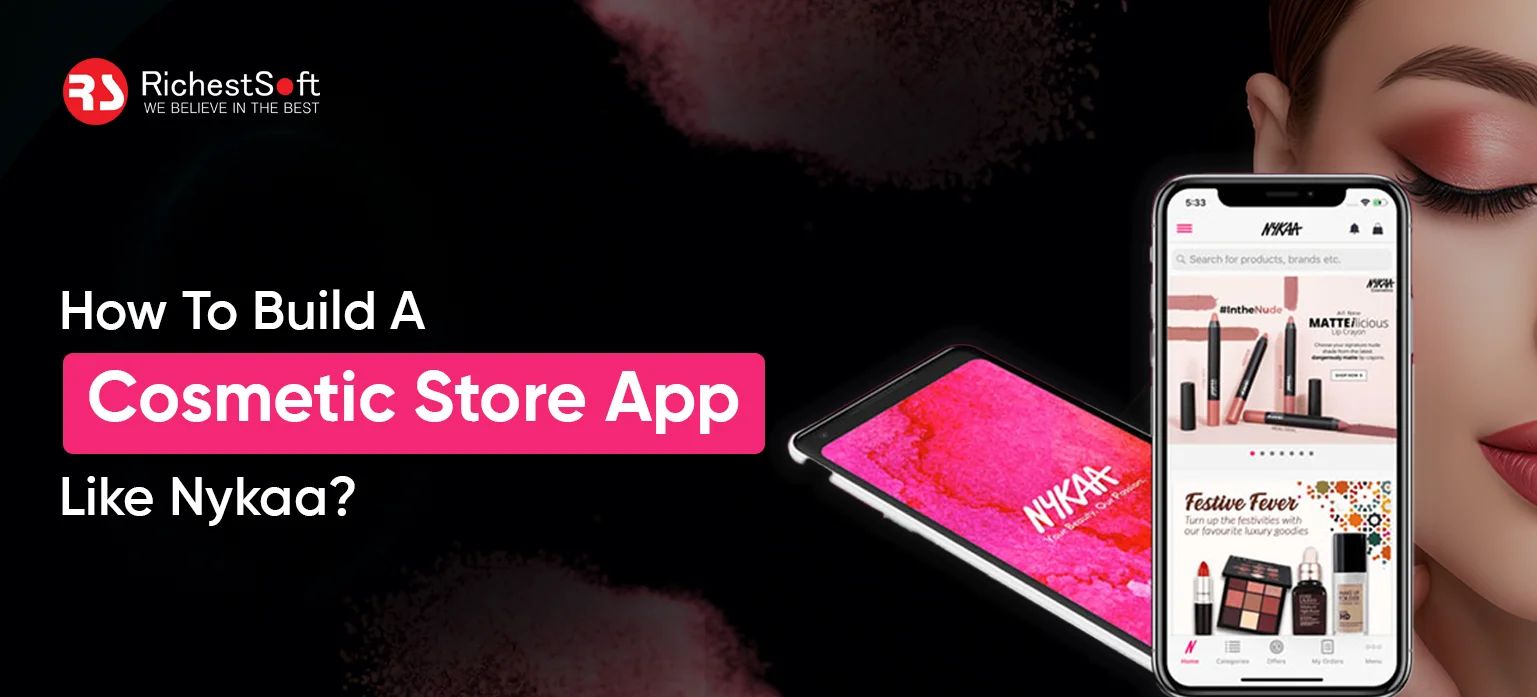September 3, 2025
Running a business, whether online or offline, in this fast-growing era demands massive user engagement and retention to achieve high ROI. However, within countless business models, Nykaa stands out as a juggernaut of growth and profitability in the cosmetic industry. The platform has not just captivated a huge audience base but has also influenced several business enthusiasts to build a cosmetic store app like Nykaa. Want to know why?
Well, Nykaa’s business model stands out in the market with its omnichannel approach, blending perfectly with content-driven engagement, offering a vast product selection, personalized recommendations, and a strategic online presence. It builds brand loyalty by educating consumers and providing exclusive international and private-label beauty and fashion brands. And that’s exactly what makes it unique among other businesses.
So, looking to start up a similar brand? Keep reading this post! Below, we have shared a detailed guide on how to develop a Cosmetic App Like Nykaa.
An Overview of Nykaa’s Business Model
Nykaa has made a strong online presence in the business world. But how? Let’s discuss here. Nykas is a D2C eCommerce platform that uses the inventory-led model, where it purchases branded, high-quality products, stores them in its warehouses and trades them online via an online platform. Whether it’s a woman looking for the next beauty product or a man looking for quality clothes, the platform grabs its targeted audience with its wide product range, curated content, product quality, and tailored recommendations.
Also let us be real with you that the platform runs on strong user engagement, customer loyalty, and smooth service across every touchpoint. Smart partnerships, exclusive in-house brands, and focused campaigns have helped Nykaa grow into a profitable and scalable business. It has set a standard for modern retail and digital commerce. Curious to know more? Here’s a detailed breakdown of its business model highlights:
Omnichannel Retail Strategy
Nykaa is not just a simple online eCommerce platform, its model runs in physical mode also, ensuring a strong customer experience, convenience, and accessibility. This strengthens brand presence while capturing audiences who prefer different shopping formats.
Private Label & Third-Party Products
The platform combines its own in-house products with well-known third-party brands. This variety keeps the catalogue fresh while their own product brings in better profits for the business.
Content-Driven Engagement
Nykaa goes beyond selling products. It connects with customers through beauty tutorials, expert tips, and real reviews. This makes the platform feel more like a trusted guide than just a store.
Loyalty Programs
Shoppers who stick around get rewarded with discounts, points, and exclusive deals. These programs make customers feel valued and encourage them to keep coming back.
Strategic Partnerships
Nykaa works closely with popular brands and influencers to reach new audiences. These partnerships boost visibility and keep the brand strong in an ever-changing market.
Steps to Build a Nykaa Clone

Launching a Nykaa clone is not easy at all; it requires careful vision planning, building effective strategies, and executing them. Entrepreneurs must follow each development step precisely. Want to know how? Here are some steps you must take note of:
Strong Vision, Understanding, & Strategy Building
Before beginning with the development, first start with some research about the market, identify your targeted audience, analyze the competitor’s patterns, and their gaps. Define potential revenue streams such as commission-based sales, subscription models, and private label products. This approach helps align business growth with financial plans while reducing risks linked with scaling too quickly.
Choose a Platform
Once the strategy is ready, choose a platform, whether iOS, Android, or both. It matters because it can directly influence how you reach your targeted audience. Native apps for iOS or Android give smooth performance, while hybrid apps save time when launching on multiple platforms. A smart platform choice helps reach more users, keeps the app reliable, and builds trust that encourages people to return.
Choose a Business Model
Now, choose a business model wisely that matches audience convenience. For example, you can consider commissions, direct retail, or subscription-based services. Integrate private label products to improve profit margins. Align pricing strategies based on who your customers are, local demand, shipping, and promotions.
Business-Driven Integrations
Integrate essential third-party services, features, or technologies in your platform. Each integration must support operational efficiency, enhance user experience, and enable scalability. Strategic integration improves user engagement and strengthens overall platform credibility.
UI/UX Design
Develop a visually appealing and easy-to-navigate interface that guides customers toward purchases effortlessly. Prioritize product discovery, search functionality, and smooth checkout processes. Maintain consistent branding across web and app interfaces, focusing on readability, micro-interactions, and personalized recommendations.
Platform Testing
Don’t deploy your app before performing testing. It validates a platform’s functionality, performance, and security before launch. Test payment gateways, product listing updates, promotional logic, and inventory synchronization. Perform stress tests for peak traffic scenarios and cross-device compatibility assessments.
Deployment
Deploy the app in stages, starting with a controlled beta or soft launch. Collect early user feedback to refine features and resolve potential issues. A staged deployment reduces risks, allows testing at scale, and ensures a smooth experience for both customers and partners during full-scale rollout.
Continuous Maintenance and Updates
After launch, maintain the platform with regular updates, bug fixes, and performance enhancements. Introduce new features based on user feedback, analytics insights, and market trends. Regular maintenance ensures the platform stays competitive, scalable, and secure.
Cost to Build A Cosmetic Store App Like Nykaa
Making a budget is an essential step for any investor or business enthusiast looking to start a Nyka-like app. A well-planned budget ensures that resources are allocated wisely and effectively on must consider things, and ensures future scalability is never compromised.
Generally, the cost to build a white label Nykaa clone usually ranges between $20,000 and $250,000. However, let us tell you that the cost can also go beyond $300k, depending on several factors, for example, the complexity of the app, features integrated and so on.
Also, you can consider this- if you want to start small, you can either invest in an MVP or build a clone with basic features, which will need a smaller budget. In contrast, if you want to build a full-scale platform with advanced features, then it could range higher.
However, partnering with experienced developers like RichestSoft helps in building a budget-friendly yet scalable solution. Our expertise ensures precise feature planning, efficient execution, and long-term reliability, allowing brands to confidently step into the competitive digital commerce space.
Conclusion
At last, all we would say is that for entrepreneurs, the chance to launch a cosmetic store app like the Nykaa app is profitable. However, despite everything, if you are confused about where to start, then RichestSoft will help you transform such ideas into powerful platforms with smooth features and lasting value. The team focuses on designing scalable solutions that keep audiences connected and businesses ahead. With the right strategy and a trusted partner like RichestSoft, launching a Nykaa clone becomes the first step toward lasting growth.
 +1 315 210 4488
+1 315 210 4488 +91 99888 06489
+91 99888 06489









